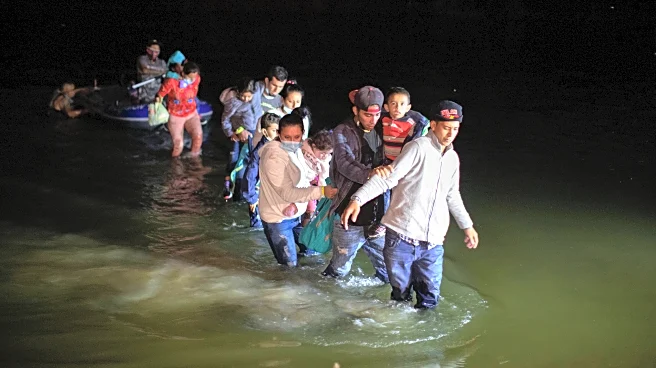What is the story about?
What's Happening?
Israel and Hamas are preparing to implement a deal for the release of hostages and a ceasefire in Gaza, following acceptance of the first phase of President Trump's plan. The Israeli Security Cabinet is scheduled to meet to authorize the release of Palestinian prisoners in exchange for hostages. This marks the initial stage of the agreement, with further components to be approved later. The plan includes a withdrawal of IDF forces from Gaza City, retaining control over 53% of the territory. A 72-hour countdown will commence for Hamas to release hostages once the withdrawal is complete. President Trump is expected to arrive in Israel to address the Knesset, celebrating the agreement as a global achievement.
Why It's Important?
The agreement brokered by President Trump is significant as it aims to end hostilities in Gaza and facilitate the release of hostages, potentially stabilizing the region. The deal underscores the U.S.'s role in international diplomacy and conflict resolution. It impacts Israeli security, as the withdrawal line is designed to ensure safety while allowing for re-entry if necessary. The release of prisoners and hostages could improve relations between Israel and Hamas, although the exclusion of high-profile prisoners may affect negotiations. The involvement of an international task force to recover remains highlights the humanitarian aspect of the agreement.
What's Next?
Following the government's approval, IDF forces will withdraw, initiating the countdown for Hamas to release hostages. The international task force will work to locate and recover remains of deceased hostages. Negotiations continue to finalize the list of Palestinian prisoners for release. President Trump's visit to Israel may further diplomatic efforts and reinforce U.S. influence in the region. The success of the agreement could lead to broader discussions on governance and reconstruction in Gaza, with potential long-term impacts on regional peace.
Beyond the Headlines
The deal raises ethical questions about the balance between security and humanitarian concerns. The exclusion of certain prisoners from the exchange may reflect political calculations and security priorities. The agreement could shift cultural perceptions of conflict resolution, emphasizing negotiation over military action. Long-term implications may include changes in Israeli and Palestinian relations, with potential impacts on future peace processes.

















